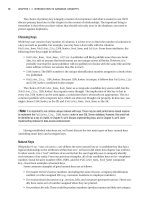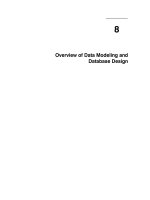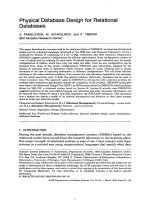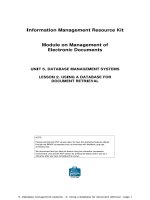database design document firefly dashboard
Bạn đang xem bản rút gọn của tài liệu. Xem và tải ngay bản đầy đủ của tài liệu tại đây (1.09 MB, 20 trang )
<span class="text_page_counter">Trang 1</span><div class="page_container" data-page="1">
<b>Nguyen Thi Yen Nhi Dinh Viet Nhat Tan</b>
<b>Tang Ngoc TuanNgo Le Hoang</b>
<b>Approved by</b>
<b>Huy Nguyen Dang Quang M.Sc.</b>
<b>Proposal Review Panel Representative:</b>
<b>Capstone Project 2-Mentor:</b>
</div><span class="text_page_counter">Trang 2</span><div class="page_container" data-page="2"><b>PROJECT INFORMATIONProject </b>
27211200906 Tan Dinh Viet
</div><span class="text_page_counter">Trang 3</span><div class="page_container" data-page="3"><b>PROJECT PLAN DOCUMENT</b>
Nhi Nguyen Thi Yen Member Tuan Tang Ngoc Member
</div><span class="text_page_counter">Trang 4</span><div class="page_container" data-page="4">DOCUMENT HISTORY
</div><span class="text_page_counter">Trang 5</span><div class="page_container" data-page="5">2.1. Database Management System Configuration...2
2.2. Database Software Utilities...3
2.3. Support Software... 3
3. Database-Wide Design Decisions...3
3.1. Key Factors Influencing Design...3
3.2. Performance And Availability Decisions...3
4. Database Administrative Functions...3
</div><span class="text_page_counter">Trang 6</span><div class="page_container" data-page="6"><b>LIST OF TABLES</b>
<b>Table 1: System Overview... 2</b>
<b>Table 2: Acronyms And Abbreviations...2</b>
<b>Table 3: Database Software... 3</b>
<b>Table 4: Support Software... 3</b>
<b>Table 5: Responsibility... 3</b>
<b>Table 6: Systems Using the Database...3</b>
<b>Table 7: Personal... 4</b>
<b>Table 8: Job History... 5</b>
<b>Table 9: Emergency Contacts... 6</b>
<b>Table 10: Employment... 7</b>
<b>Table 11: Benefit plans... 8</b>
<b>Table 12: Migration History... 8</b>
<b>Table 13: Employee... 9</b>
<b>Table 14: Pay Rates... 10</b>
</div><span class="text_page_counter">Trang 7</span><div class="page_container" data-page="7"><b>TABLE OF FIGURES</b>
<b>Figure 1. Entity Mapping...14</b>
</div><span class="text_page_counter">Trang 8</span><div class="page_container" data-page="8">CMU 1
<b>1. Introduction1.1. Purpose</b>
Setting up an overview about the database of Firefly web application. Provides database tables and the relationship between them.
Description designing a database (DB), a collection of data related to storage on a computer through database management system as a basis for data query related software.
Provide the entire needed database for OSM web application.
<b>1.2. Document Objectives</b>
The Database Design Document has the following objectives
To describe the design of a database, that is, a collection of related data stored in one or more computerized files that can be accessed by users or developers via a DBMS.
To serve as a basis for implementing the database and related software units. It provides the acquirer visibility into the design and provides information necessary for software development.
<b>1.3. Intended Audience</b>
This document is intended for the following audiences
Technical developers, who must evaluate the quality of this document Developer including:
o Architects, whose overall architecture design must meet the requirements specified in this document.
o Designers, whose design must meet the requirements specified in this document.
o Developers, whose software must implement the requirements specified in this document. Quality Assurance personnel, whose test cases must validate the requirements specified in this document.
<b>1.4. Scope</b>
This Database Design Document provides the basic database design of OSM web application.
</div><span class="text_page_counter">Trang 9</span><div class="page_container" data-page="9">CMU 2 It describes both logical and physical definition, non-functional, database interfaces, tables, code create tables.
It includes the tables and performance considerations and requirements. The following topics are covered in this document:
o Assumptions and decisions on database design o Entity – mapping
o Table, column definitions
o Column and row level validation rules (check constraints) o Interfaces and dependencies with other components.
This Database Design Document of Online Service Market web application is composed of definitions for database objects derived by mapping entities to tables, attributes to columns, unique identifiers to unique keys and relationship to foreign keys.
<b>1.5. System Overview</b>
<i><b>Table 1: System Overview</b></i>
<b>1.6. Acronyms And Abbreviations</b>
<i><b>Table 2: Acronyms And Abbreviations</b></i>
</div><span class="text_page_counter">Trang 10</span><div class="page_container" data-page="10">CMU 3 - Services enabled: Linux Virtual Machine
<b>2.2. Database Software Utilities</b>
<i><b>Table 3: Database Software</b></i>
Oracle Corporation
This application enables the ability to manage MySQL database using GUI.
SQL Server management studio
SQL Server <sup>19</sup> <sup>This application enables the ability</sup> to manage SQL server database using GUI.
<b>2.3. Support Software</b>
<i><b>Table 4: Support Software</b></i>
Workbench <sup>8.0</sup> <sup>Generate ERD diagram of MySQL database.</sup> SQL Server
<b>3. Database-Wide Design Decisions3.1. Key Factors Influencing Design</b>
- The database should be designed independent when the frontend and backend are still being developed.
- The database should be designed to meet the data warehouse principles.
We use common dimensional tables for all the fact tables for better performance
<b>4. Database Administrative Functions</b>
</div><span class="text_page_counter">Trang 11</span><div class="page_container" data-page="11">CMU 4 System and
Security Administrator
<b>4.2. Applications/Systems Using the Database</b>
<i><b>Table 6: Systems Using the Database</b></i>
</div><span class="text_page_counter">Trang 12</span><div class="page_container" data-page="12">The id is the primary key for Employee
the Employee.
Last Name nvarchar(50) True <sup>The Last Name of the</sup><sub>Employee.</sub>
the Employee. Address1 nvarchar(50) True <sup>The Address 1 of the</sup><sub>Employee.</sub> Address2 nvarchar(50) True <sup>The Address 2 of the</sup><sub>Employee.</sub>
Employee live.
State nvarchar(50) True <sup>The State where</sup><sub>Employee live.</sub>
Employee.
</div><span class="text_page_counter">Trang 13</span><div class="page_container" data-page="13"><i><b>Table 8: Job History</b></i>
autoIncrement <sup>PK</sup> <sup>False</sup>
The id is the primary key for Job History record.
User identification number. Foreign key to
Employee.ID Department nvarchar(50) True Department of Job History.
Division nvarchar(50) True Division of Job History.
Start Date datetime True <sup>Date and time the record</sup><sub>was created.</sub>
was ended. Job Title nvarchar(50) True Job Title of Job History.
</div><span class="text_page_counter">Trang 14</span><div class="page_container" data-page="14">CMU 7 Supervisor nvarchar(50) True Supervisor of Job History.
Job Category nvarchar(50) True <sup>Job Category of Job</sup> History.
Location nvarchar(50) True Location of Job History. Departmen_C
Departmen Code of Job History. Salary Type nvarchar(50) True Salary Type of Job History.
Pay-Period nvarchar(50) True Pay-Period of Job History.
Hours per Week of Job History. Hazardous
Job History has Hazardous
The id is the primary key for Emergency
</div><span class="text_page_counter">Trang 15</span><div class="page_container" data-page="15">The id is the primary key for Employment
Hire Date datetime True <sup>Date and time the record</sup><sub>was created.</sub> Workers_Co
Workers Comp Code of Employment. Termination
Date and time the record was ended.
was created again. Last Review
was last updated.
</div><span class="text_page_counter">Trang 16</span><div class="page_container" data-page="16">The id is the primary key for Benefit plans
record. Plan Name nvarchar(50) True <sup>The name of the</sup><sub>Benefit plans.</sub>
Migrationld <sup>nvarchar(150)</sup> PK False
The id is the primary key for Migration History
ContextKey nvarchar(150) PK False
Context Key is the primary key for Migration
History record.
</div><span class="text_page_counter">Trang 17</span><div class="page_container" data-page="17">F <sup>The id is the primary key</sup> for Employee record.
</div><span class="text_page_counter">Trang 18</span><div class="page_container" data-page="18">Last Name
varchar(45) False Last Name of Employee. .
First Name varchar (45) False <sup>First Name of Employee.</sup>
Pay Rates identification number. Foreign key to
Paid Last Year of Employee.
11
</div><span class="text_page_counter">Trang 19</span><div class="page_container" data-page="19"><i><b>Figure 1. Entity</b></i>
12
</div>








